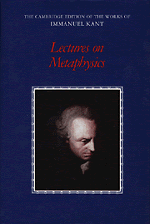Book contents
- Frontmatter
- Contents
- General editors' preface
- Acknowledgments
- Translators' introduction
- Guide to abbreviations and the translators' notes
- I Metaphysik Herder, 1762–1764 (selections) (Ak. 28: 39–53)
- II Metaphysik L1, mid-1770s (complete except for the Natural Theology and Heinze extracts) (Ak. 28: 195–301)
- III Metaphysik Mrongovius, 1782–1783 (complete) (Ak. 29: 747–940)
- IV Metaphysik Volckmann, 1784–1785 (selections) (Ak. 28: 440–450)
- V Metaphysik L2, 1790–1791? (complete except for the Natural Theology) (Ak. 28: 531–594)
- VI Metaphysik Dohna, 1792–1793 (selections) (Ak. 28: 656–690)
- VII Metaphysik K2, early 1790s (selections) (Ak. 28: 753–775)
- VIII Metaphysik Vigilantius (K3), 1794–1795 (complete) (Ak. 29: 943–1040)
- English-German glossary
- German-English glossary
- Latin-German equivalents occurring in the text
- Concordance of Baumgarten's Metaphysics and Kant's Metaphysics lectures
- Explanatory notes (with bibliography of Kant's works cited)
- Name Index
- Subject index
VII - Metaphysik K2, early 1790s (selections) (Ak. 28: 753–775)
Published online by Cambridge University Press: 05 May 2013
- Frontmatter
- Contents
- General editors' preface
- Acknowledgments
- Translators' introduction
- Guide to abbreviations and the translators' notes
- I Metaphysik Herder, 1762–1764 (selections) (Ak. 28: 39–53)
- II Metaphysik L1, mid-1770s (complete except for the Natural Theology and Heinze extracts) (Ak. 28: 195–301)
- III Metaphysik Mrongovius, 1782–1783 (complete) (Ak. 29: 747–940)
- IV Metaphysik Volckmann, 1784–1785 (selections) (Ak. 28: 440–450)
- V Metaphysik L2, 1790–1791? (complete except for the Natural Theology) (Ak. 28: 531–594)
- VI Metaphysik Dohna, 1792–1793 (selections) (Ak. 28: 656–690)
- VII Metaphysik K2, early 1790s (selections) (Ak. 28: 753–775)
- VIII Metaphysik Vigilantius (K3), 1794–1795 (complete) (Ak. 29: 943–1040)
- English-German glossary
- German-English glossary
- Latin-German equivalents occurring in the text
- Concordance of Baumgarten's Metaphysics and Kant's Metaphysics lectures
- Explanatory notes (with bibliography of Kant's works cited)
- Name Index
- Subject index
Summary
Rational psychology
<Psychologia rationalis>
teaches the nature of the human soul. Soul is the subject of sensation. In German it always indicates something inner, as e.g., the soul of a feather, a canon, i.e., the line drawn through the center of the mouth to the center of the ground. Mind <psyche> means butterfly <papillori>. Thus in this naming of the soul there lies an analogy with a butterfly, which is hidden preformed in the caterpillar, which is nothing more than its husk. This teaches that in this world dying is nothing more than regeneration. Soul <anima> is the animating principle in an animal. Matter cannot live for itself. This is a proposition against hylozoism. If one assumes that matter as matter thinks, lives, i.e., acts according to representations, then this is above all contrary to physics; that parts of matter are not moved by others, but rather can move themselves, contradicts the principle of inertia. Pythagoras says something mystical: the soul is a number moving itself <numerus se ipsum movens>. Soul <anima> is the sensible, mind <animus> the intellectual faculty of the soul. Mind <mens, nous> is this in any event. – Soul and spirit are to be sure two distinct relations but only two faculties of one and the same subject.
A living being has only one soul, this is a principle in psychology. The consciousness of the unity of my soul follows already from the conscious-ness of my subject.
- Type
- Chapter
- Information
- Lectures on Metaphysics , pp. 393 - 414Publisher: Cambridge University PressPrint publication year: 1997



